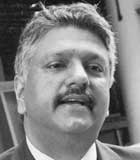Nicholas Piramal India, a dominant player in the domestic pharmaceutical industry with major presence in formulations, diagnostics and vitamins, appears to be unfazed by the anticipated consequences of the product patent regime that comes into play from January 2005.
 Nevertheless, the company is bracing itself to meet the challenges. Ajay Piramal, chairman of Nicholas Piramal India, in an interview with Rumi Dutta, discussed the fundamentals on the Indian pharma industry and the company's unique business model supported by pillars of marketing & distribution, manufacturing, global alliances and research & development.
Nevertheless, the company is bracing itself to meet the challenges. Ajay Piramal, chairman of Nicholas Piramal India, in an interview with Rumi Dutta, discussed the fundamentals on the Indian pharma industry and the company's unique business model supported by pillars of marketing & distribution, manufacturing, global alliances and research & development.
What is your take on the product patent era that comes into effect from January 2005? How are the Indian drug manufacturers positioned in light of the World Trade Organisation regime?
Come January 2005, products that have been patented after 1995 will not be allowed to be copied. This essentially means that the reverse engineering technique on which the domestic industry has been thriving will come to a halt.
What we need to understand is the fact that while the date is 2005, the effective date would be 2007-08. It takes time for a product to get patented and come out in the market and I assume that it will not be in 2005 when the actual impact would be felt.
Secondly, if we take a closer look at the products patented after 1995, we will find that either these set of products are in certain niche therapeutic areas such as Parkinson's disease, cancer -- which are the diseases primarily of the western world -- or the products are just marginal improvements over the existing treatments available in different therapeutic areas.
There are not many breakthrough discoveries that have taken place in mainstream prime segments like cerebral neuropsychiatry, diabetes or in cardiovasculars.
The other thing, most importantly, is that drug prices in India are much lower compared with the western world. Keeping all these in mind, I don't think there will be any significant impact of the WTO regime.
Countries like Poland and Brazil started recognising product patents around 5-6 years before us. There has not been much of an impact in these countries. The point to note is that these countries never had as strong a domestic pharmaceutical industry like in India.
We must also not forget that among the top ten companies in India, only three are multinationals (GlaxoSmith Pharmaceuticals, Pfizer and Aventis). Post 2005, I don't see multinationals making a big difference in India.
What is Nicholas Piramal doing to get ready for the product regime? Are there any special initiatives that the company is taking in light of the patent era?
The first and foremost thing we are doing is strengthening ourselves in sales and marketing. This is because we foresee that the market is going to grow from the urban to the semi-urban.
Today India produces around 20,000 doctors every year and these is a clear trend of doctors moving to the semi-urban areas.
So, that is where modern medicine is expected to go. Also, we must bear in mind that only 35 per cent of the market is covered by allopathic medicine.
Today we have the largest field-force in the industry. After acquiring the balance 50 per cent equity in Sarabhai Piramal, our field force stands increased to 2,800. With a large sales force, we will be able to make a difference.
We are also enhancing the quality of marketing and are investing around Rs 15 crore (Rs 150 million) in actively creating field automation. It would not easy for the multinational companies to edge us out.
Also, there are many mid-sized foreign companies that are looking at entering India. We would emerge as potential marketing and distribution alliance partners.
While ultimately we will have our own research based product, post 2005 there will be more products in the country through in-licensing and co-marketing alliances.
Contract research/manufacturing is Nicholas Piramal's mantra. How is the company positioned to cash in on this?
Most of the Indian companies are looking at the international markets and are trying to be the first to file for the Para IV filings in the US.
This means that these companies are closely monitoring the patent expiry dates to introduce a quick generics product once the patent expires.
They are looking at the loopholes in the US FDA regulations and trying to take advantage of that to introduce their generic product.
It is not only Indian companies adopting this route but many companies from across the globe have embarked on the same bandwagon.
We feel that this is a risky strategy as there are many companies adopting the same strategy. We do not intend to make any patent challenges or get into a competition with the MNCs.
Instead of competing with the innovator, we are talking of collaboration. It could either be custom chemical synthesis collaboration or a collaboration in manufacturing active pharmaceutical ingredients (APIs).
It could also be some development work in the basic chemistry or it could be formulations. This is the model of contract manufacturing that we are adopting.
We are in talks with global majors for contract manufacturing. We expect sizable revenue from this area because innovator companies are trying to concentrate more on the research side of the value chain or on the sales and marketing.
With the recognition of India as a high quality and low cost manufacturing base, we are well poised to grab maximum benefits.
What to your mind would be the single most significant impact of a patent era?
A major consolidation drive would sweep through the Indian pharmaceutical industry. Many mid and small sized companies will find it difficult to grow in the market without an access to reverse engineering and limited reach in the export market. Domestic majors as well as multinationals would jump into the fray to grab the opportunity.
Export focus has been key to the success of domestic pharmaceutical firms. Nicholas Piramal has, however, not been very active on the export front till recently. Could you throw some light on your export strategy?
We expect our export turnover to cross Rs 100 crore (Rs 1 billion) by the end of this fiscal. Custom manufacturing will be a major part of our exports and we expect that our exports would stand doubled next year. Over a period of five year, we expect our exports to be 50 per cent of our total turnover.
What is the status on the R&D front? The company, I understand is working on oncology, anti-fungal and anti-diabetics molecules.
We hope that in the next financial year one of the molecules will go into the clinical trial stage. Meanwhile, we are actively setting up research centres and have a strong R&D team.
What kind of topline growth do you expect in future?
We have given a guidance for the financial year 2004. We said that we expect a 18-20 per cent growth in total sales in FY04.
Could you articulate your expansion strategy? Also, could you elaborate on the results of the product portfolio restructuring that you had undertaken in the recent past.
Expansion would essentially depend on the order status. We are looking at both domestic as well as international market for acquisitions.
Wherever there is a gap in our business portfolio in a strategic sense, we are open to the opportunities available. On the OTC front, through Boots Piramal we already have a leadership in headache segment.
Also, as and when we find that a brand has matured and is fit to be converted to OTC from prescription, we can transfer the brand to our OTC portfolio.
We had categorised our formulations basket into primary, secondary and tertiary. Currently, our top ten brands constitute around 36 per cent of the total formulation sales and have grown at the rate of 16 per cent against an industry growth of 4.5 per cent in the first six months.
We are in nine therapeutic areas out of which seven have outperformed the market. Overall, we have grown by around 13 per cent against a 4.5 per cent market growth. Products under DPCO now account for 11 per cent of formulations sales.







